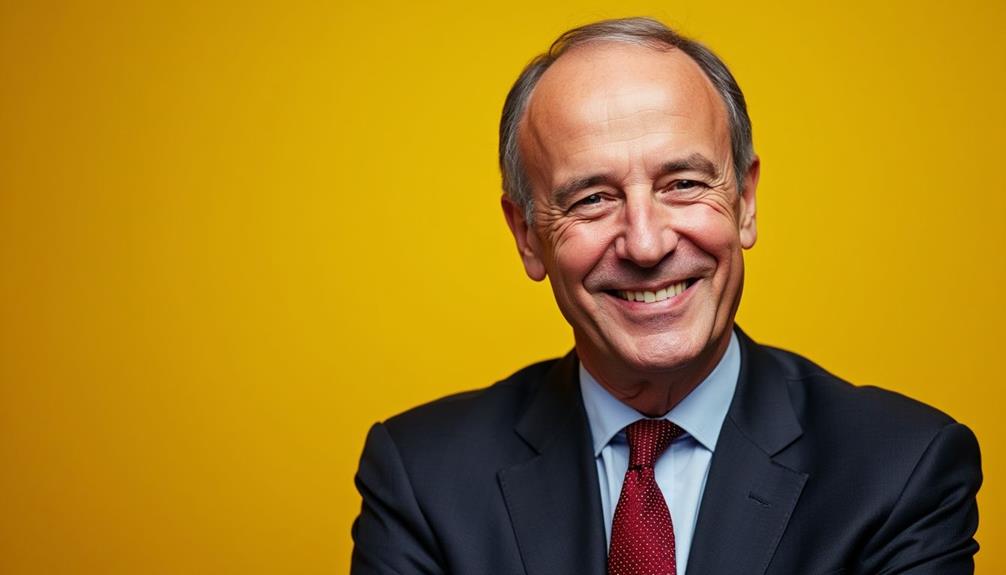
- Francois Hollande's key economic policies included increasing taxes on the wealthy, creating state-sponsored job programs, and implementing labor reforms aimed at boosting economic flexibility.
- Francois Hollande's presidency saw modest economic growth in France, influenced by his policies which aimed at job creation and increased public spending but were often criticized for lacking efficacy.
- Francois Hollande's legacy in French politics includes significant labor market reforms and efforts to address unemployment, though his presidency is also marked by high dissatisfaction ratings and economic challenges.
- Hollande's policies, including fiscal austerity measures and advocacy for EU integration, reinforced France's commitment to the European Union but faced criticism for not significantly enhancing France's influence within the EU.
- Major challenges during Francois Hollande's presidency included managing high unemployment rates, widespread public protests against labor reforms, and responding to multiple terrorist attacks on French soil.
Throughout the annals of French political history, few figures have elicited as much controversy and debate as François Hollande.
In This Article, You Will Discover:
A stalwart member of the Socialist Party, Hollande's presidency was marked by bold decisions and tumultuous events that left an indelible mark on the French political landscape.
Early Life and Career
François Hollande's political journey was deeply influenced by his family background and education.
Born into a left-wing household, he was instilled with values that would shape his future as a prominent figure in French politics.
His rise in French politics was gradual but steady, culminating in his eventual nomination as the presidential candidate for the Socialist Party.
Family Background and Education
Coming from a lineage of socialist ideals, François Hollande was immersed in the world of left-wing politics from a young age.
His education at the prestigious école nationale paved the way for his future involvement in the French political arena, setting the stage for a career defined by socialist principles.
Rise in French Politics
As François Hollande ascended the ranks of French politics, his early political influence became evident in his policies and decision-making.
From serving as the Mayor of Tulle to his tenure as President of France, Hollande's political trajectory was marked by a commitment to socialist values and a vision for a more inclusive society.
Presidency of François Hollande
François Hollande assumed the presidency of France in May 2012 after a closely fought presidential election.
During his tenure, he implemented a series of economic policies and reforms aimed at tackling issues such as high unemployment rates and stagnant economic growth.
Hollande also faced challenges on the international front, particularly with regards to military interventions in Mali and the Central African Republic.
Economic Policies and Reforms
One of the key focuses of Hollande's presidency was revitalizing the French economy. He introduced measures to stimulate growth and create jobs, including labor market reforms and investment in infrastructure projects.
However, his efforts were met with mixed reactions, and Hollande's approval ratings fluctuated as the country grappled with economic uncertainties.
Foreign Policy and International Relations
On the global stage, François Hollande pursued an active foreign policy agenda. He played a significant role in the military intervention in Mali to combat the growing threat of terrorism in the region.
Additionally, Hollande worked closely with European partners and the United Nations on matters of international security and humanitarian crises, demonstrating France's commitment to global cooperation.
Social Reforms and Domestic Initiatives
Domestically, Hollande championed social reforms such as legalizing same-sex marriage and expanding access to education.
He also declared a state of emergency following terrorist attacks in Paris in January 2015, underscoring his commitment to ensuring the safety and security of French citizens.
Despite facing criticism for his policies, Hollande remained steadfast in his pursuit of progressive social initiatives.
Comparison with Predecessors
When comparing François Hollande's presidency with his predecessors, notable differences and similarities emerge.
In contrast to Nicolas Sarkozy's more conservative approach, Hollande's socialist policies represented a shift towards a more inclusive and egalitarian society.
On the other hand, Emmanuel Macron, Hollande's successor, introduced a mix of economic liberalism and social reforms, showcasing a departure from Hollande's governance style.
Nicolas Sarkozy's Presidency
Nicolas Sarkozy's presidency, which preceded Hollande's, was characterized by a focus on economic reforms and a pro-business agenda.
While Sarkozy implemented policies to boost competitiveness and growth, his leadership style differed significantly from Hollande's more consensus-oriented approach, leading to contrasting legacies for both presidents.
Emmanuel Macron's Policies
Emmanuel Macron, who followed Hollande as the President of France, introduced a series of economic reforms aimed at liberalizing the French economy and attracting foreign investment.
Macron's neoliberal policies diverged from Hollande's socialist leanings, reflecting a broader shift in French political dynamics towards a more centrist and market-oriented framework.
Distinctive Leadership Style of François Hollande
François Hollande's leadership style was marked by a pragmatic and inclusive approach to governance.
Known for his affable personality and ability to connect with a wide range of audiences, Hollande brought a sense of relatability and empathy to the presidency.
Despite facing challenges and controversies during his term, Hollande's distinctive leadership style left a lasting impact on French politics and society.
Common Questions
Exploring the presidency of François Hollande raises several common questions that shed light on his impact on France's political and economic landscape.
What Were the Key Economic Policies of Francois Hollande's Presidency?
How Did Francois Hollande Impact France's Economic Growth?
What Legacy Did Francois Hollande Leave in French Politics?
How Did Francois Hollande's Policies Affect France's Role in the EU?
What Were the Major Challenges Faced by Francois Hollande During His Term?
Conclusion
François Hollande's presidency was marked by a mix of economic reforms, social initiatives, and distinctive leadership style that shaped his legacy in French politics.
Despite facing challenges and controversies, Hollande's commitment to socialist values and governance principles left a lasting impact on France's political landscape.



